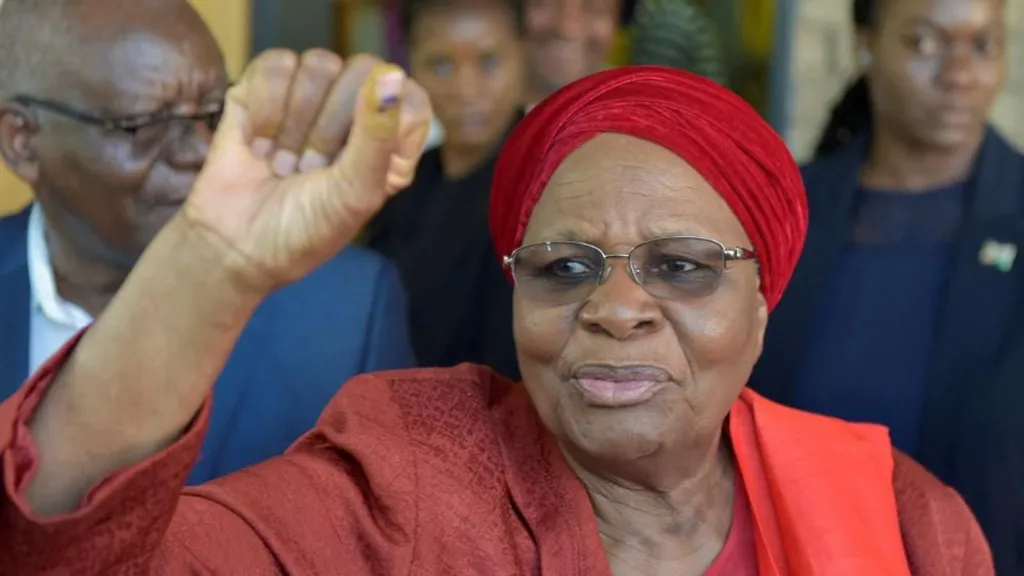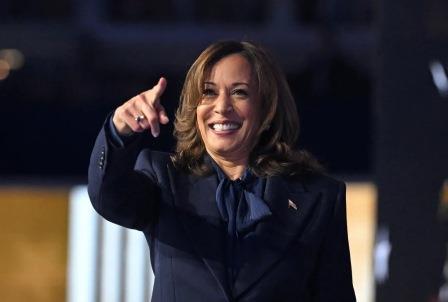Netumbo Nandi-Ndaitwah Emerges as Namibia first first female President

Netumbo Nandi-Ndaitwah has been serving as vice-president of Namibiasince February. Credit-NPM
Netumbo Nandi-Ndaitwah, from the governing South West Africa People’s Organisation (Swapo), has been voted in as Namibia’s first female president after last week’s disputed election. The electoral commission said she had won more than 57% of vote, with her closest rival Panduleni Itula, getting 26%.
Following logistical problems and a three-day extension to polling in some parts of the country, Itula said the electoral process was “deeply flawed”. His Independent Patriots for Change (IPC) party said it would challenge the results in court.
The Namibian nation has voted for peace and stability,” Nandi-Ndaitwah said after being declared president-elect.
Her win cements her governing South West Africa People’s Organisation (SWAPO) party’s 34-year hold on power since independence from apartheid South Africa in 1990 – a contested outcome.
Opposition parties have rejected the results after the election was marred by technical problems, including shortages of ballot papers and other issues, causing election officials to extend voting until Saturday. Long queues meant that some voters gave up on the first day of voting after waiting for up to 12 hours.
Nandi-Ndaitwah was promoted to vice president in February after President Hage Geingob died while in office. While in power for decades, SWAPO has disenchanted young voters due to high youth unemployment rates and enduring inequalities.
She got her start in politics by taking part in the country’s underground independence movement in the 1970s. She returned from the UK to join parliament in 1990 and went on to serve as minister with several portfolios over the years. Nandi-Ndaitwah has been a loyal member of the governing party, Swapo, since she was a teenager and pledges to lead Namibia’s economic transformation.
Nandi-Ndaitwah was born in 1952, in the northern village of Onamutai. She was the ninth of 13 children and her father was an Anglican clergyman. At the time, Namibia was known as South West Africa and its people were under occupation from South Africa. Nandi-Ndaitwah joined Swapo, then a liberation movement resisting South Africa’s white-minority rule, when she was only 14. A passionate activist, Nandi-Ndaitwah became a leader of Swapo’s Youth League.
The role set her up for a successful political career, but at the time Nandi-Ndaitwah was simply interested in freeing South West Africa.
Politics came in just because of the circumstances. I should have become maybe a scientist,” she said in an interview early this year. While still a high school student, Nandi-Ndaitwah was arrested and detained during a crackdown on Swapo activists. As a result of this persecution, she decided she could not stay in the country and joined several other Swapo members in exile.
She continued to organise with the movement while in Zambia and Tanzania, before moving to the UK to undertake an International Relations degree. Then in 1988 – 14 years after Nandi-Ndaitwah fled her country – South Africa finally agreed to Namibian independence. Nandi-Ndaitwah returned home and subsequently joined the post-independence, Swapo-run government.
In the years since, she has held a variety of posts, including ministerial roles in foreign affairs, tourism, child welfare and information. Nandi-Ndaitwah became known as an advocate for women’s rights. In one of her key achievements, she pushed the Combating of Domestic Violence Act through the National Assembly in 2002. According to Namibian media, Nandi-Ndaitwah criticised her male colleagues for trying to ridicule the draft law, sternly reminding them that the Swapo constitution condemns sexism.
She continued to rise despite Namibia’s traditional and male-dominated political culture, and in February this year she became vice-president. She suceeded Nangolo Mbumba, who stepped up after the death of then-President Hage Geingob.
In her personal life, Nandi-Ndaitwah is married to Epaphras Denga Ndaitwah, the former chief of Namibia’s defence forces. The couple has three sons. Throughout her career, Nandi-Ndaitwah has displayed a hands-on, pragmatic style of leadership.
She once declared in a speech: “I am an implementer, not a storyteller.”
In her victory speech, she shared her vision for Namibia, emphasising the need to tackle the country’s biggest challenges, including unemployment, economic reform, and social inequality. She also highlighted the importance of peace and stability, stating, “The Namibian nation has voted for peace and stability.”
As she prepares to take office, all eyes are on Netumbo Nandi-Ndaitwah. Her leadership marks a new chapter for Namibia, and the world is eager to see how she steers the nation into its next phase of growth and progress.






